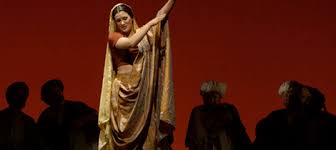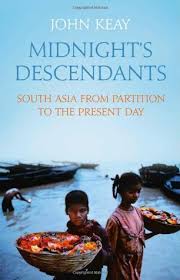From my personal blog:
[Kabir’s note: A change of pace from the usual topics. As Zack says there is no need to be so confrontational all the time]

During the mid-nineteenth century, European composers experienced a vogue for depicting the Orient on stage. Not only was the Orient an exotic location, but the operas set there spoke to the imperial anxieties of various European nations. In their essay published in Imperialisms: Historical and Literary Investigations, Linda and Michael Hutcheon write: “Opera may not appear at first to be quite the same as these other Western means explored by [Edward] Said of ‘dominating, restructuring, and having authority over the Orient’. But it is important to recall that Opera was a powerful discursive practice in nineteenth century Europe, one that created, by repetition, national stereotypes that, we argue, are used to appropriate culturally what France could not always conquer militarily” (Hutcheon 204).
In this paper, I will analyze two French Grand Operas from this period—George Bizet’s The Pearl Fishers (1863) and Leo Delibes’s Lakme (1883)—in order to determine the stereotype of the “Oriental” that was being presented to French audiences. As a point of contrast, I will also discuss Indrasabha (The Heavenly Court of Indra), an operatic drama written by the Urdu poet Agha Hasan Amanat and produced in 1855 in the palace courtyard of Wajid Ali Shah, the last Nawab of Oudh. This contrast will serve to illuminate how the operatic tradition was adapted by Indians themselves as well as the differences in the narratives about the Orient as conceived by the Occident as opposed to the Orient itself.
The Pearl Fishers is set on the island of Ceylon—the modern nation of Sri Lanka. The opera tells the story of of how two men’s vow of eternal friendship is threatened by their love for the same woman. This woman, in turn, faces a dilemma between secular love and her sacred oath as a priestess. The score is perhaps best known for “Au fond du temple saint”, the “friendship duet” for Tenor and Baritone.
In his essay “The Pearl Fishers and the Exotic”, musicologist Ross Hagen writes that “the orientalist musical language of Le desert, The Pearl Fishers, and similar works became essentially a catch-all signifier for any foreign culture full of danger, violence, superstition, taut tanned bodies and permissive sensuality.” He further argues that “the accompaniments of ‘exotic’ melodies often relied on drone pitches and fairly static rhythms as a way to lend a ‘primitive’ touch” (Utahopera.org).
Presenting such a work in the early twenty-first century has its challenges. As Hagen argues, the fact of globalization “doesn’t do these exoticist works any favors… Indian culture is also much less alien to an opera audience today than it would have been in nineteenth century Paris” (Utahopera.org). He argues that presenting a period-faithful production in which a cast of white singers attempts to look “Indian” risks being perceived as an exercise in “brown-face”. However, setting the opera in a blank “postmodern” space seems dishonest. He concludes his article by noting that: “Regardless of the path taken by an individual production, it is useful to remember that The Pearl Fishers was designed to appeal to the imaginations, prejudices, and preconceptions of a nineteenth century Parisian audience. Acknowledging the desires of the original audience perhaps creates a measure of critical distance and allows the audience to appreciate the opera without denying its place in the lineup of vaguely colonialist and patronizing works from the time period” (Utahopera.org). As John Mackenzie notes in his book Orientalism: History, Theory and the Arts: “Again perhaps, it might be possible to see the central plot conceit of a sacred virgin yielding to love as somehow parallel to the seductions of European imperialism, but it was a favorite Romantic theme and in the opera it takes place purely within a Ceylonese context” (Mackenzie 151). Thus, it is debatable whether simply setting a work in a foreign culture such as Sri Lanka makes the opera inherently colonialist.
Unlike The Pearl Fishers— in which all the characters are Sri Lankan–Delibes’s Lakme revolves around the romance between Gerald, a soldier serving in British India, and the Hindu priestess, Lakme. As Mackenzie states: “Here a British officer loves an Indian woman who sacrifices herself to save him. The imperial interpretation is obvious: the indigenous woman as sacrificial victim for the greater good of the civilizing mission, though the theme of cross-racial love is movingly portrayed in the music” (Mackenzie 151). In their own discussion of Lakme, Linda and Michael Hutcheon note that: “By the time of Lakme, the French and the British, on the other hand, had been fighting each other militarily over India and other overseas territories for more than a century… it is as if the French were seeking ways to explore other aspects of imperialism by means of the safety afforded by distance and displacement” (205).
The Hutcheons note that Gerald infantilizes Lakme. He calls her a child and believes his fellow officer when he assures him that he can leave the Hindu priestess with impunity because “These children don’t know how to suffer”. They write: “In the discourse of French imperialism, ‘peuples enfants’ was a common positive term for the colonized—seen as simple, capricious but capable of devotion and loyalty” (209). They cite Raoul Girardet’s argument that in the 1870s, France developed “a moral, economic and political doctrine and discourse of imperialism… Perhaps by contemplating the difficult situation of the imperial British in India, French audiences could consider, with greater distance, the tensions involved in their own colonial efforts somewhat more easily” (210).
Another important point made by the Hutcheons is that in these operas it is the men who act violently to protect their religion “but it is the women who articulate the immensity of the religious and cultural differences”. This connects with the general Romantic fascination with the femme fatale. Lakme commits suicide for the love of a European man. The Hutcheons cite Binita Metha’s argument in Widows, Pariahs and Bayaderes: India as Spectacle that “the sacrifice of the (subject) woman is the formulation upon which the colonial (male) ideology of temptation and duty are resolved” (211).
You can read more here
 I recently read John Keay’s Midnight’s Descendants: A History of South Asia since Partition. Like his earlier books on the history of India and China, this is a work written by a journalist, not an area specialist (though Keay seems to take a particular interest in South Asia judging by his oeuvre).
I recently read John Keay’s Midnight’s Descendants: A History of South Asia since Partition. Like his earlier books on the history of India and China, this is a work written by a journalist, not an area specialist (though Keay seems to take a particular interest in South Asia judging by his oeuvre).